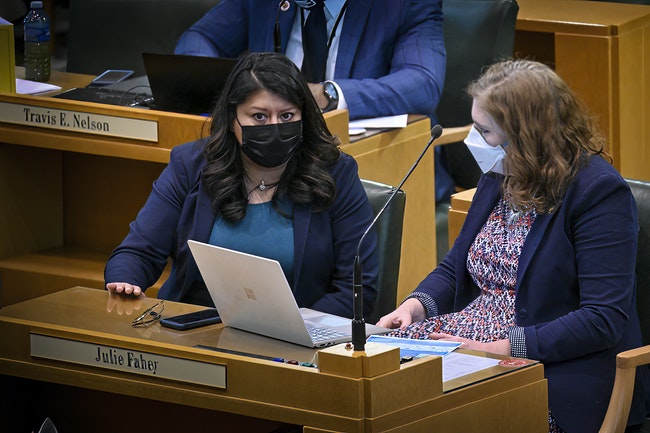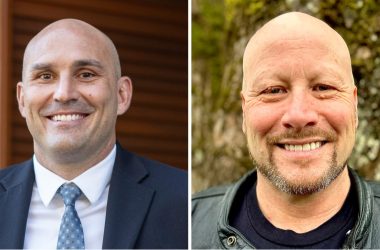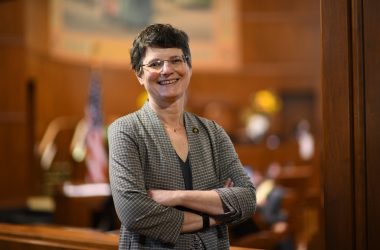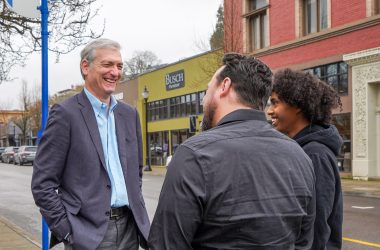
Rep. Teresa Alonso Leon, left, lost her congressional race but may have a chance of returning to the Legislature after Senate nominee Eric Swenson dropped out. (Ron Cooper/Oregon Capital Chronicle)
A state representative who couldn’t win her primary for Congress could get a second chance at elected office in a move unsettling Oregon Democratic party politics.
Rep. Teresa Alonso Leon, who has represented Woodburn since 2017, came in seventh in a crowded Democratic primary for Oregon’s new 6th Congressional District last month. Her friend and political ally, Woodburn Mayor Eric Swenson, won his own primary in a competitive state Senate race that includes Keizer, Woodburn and north Salem.
Then Swenson called Alonso Leon last week with an idea. He wanted to keep serving as mayor, and he wanted to know if she would seek the nomination in his stead.
“I was very surprised at that turn of events,” she told the Capital Chronicle on Monday. “I was anticipating having a conversation with him about how I was going to support his campaign.”
She thought about it over the weekend, talked with her parents and decided to seek appointment to replace Swenson on the fall ballot. Her term ends in December.
Because Swenson dropped out after winning the primary, Democratic precinct committee people in the district will choose his replacement. The Democratic Party of Oregon plans to announce those deadlines and the process to follow soon, with the goal of having a new nominee in place by the end of the month.
But Swenson’s sudden exit, and his decision to endorse Alonso Leon, raised eyebrows in the district. Now, instead of Democratic voters deciding who will face Sen. Kim Thatcher, R-Keizer, in the fall, a few dozen members of the Democratic Party will choose.
Senate President Peter Courtney, who represents the district now and retires this year, said he was shocked when the director of the political action committee for Senate Democrats called him Friday to tell him Swenson was quitting. He still hasn’t spoken to Swenson.
“I thought our side was gearing up to support him so that he can make a run at that seat, because it’s gonna be a tough seat,” Courtney said. “It’s gonna be a tough political battle. And next thing I know I get this call, and I’m still dazed by the whole thing, to be frank with you.”
Brian Clem, a former state representative who advised runner-up Rich Walsh in his Senate campaign, said the circumstances surrounding Swenson’s exit could make the district harder for Democrats to win. He encouraged Swenson to keep running.
“I think (Thatcher is) very beatable, but I think it would be very difficult for someone to beat her if you yourself are also part of a very, very inappropriate sounding sort of bait-and-switch game,” Clem said. “If you’re clean of that, if you’re not the beneficiary of Eric stepping down, I think you could beat her.”
Clem stressed that he doesn’t think Alonso Leon was aware of any plans for what he considers a bait-and-switch. The two are friends and he supported her Congressional run, and he thinks she’s a victim of a plan orchestrated without her knowledge.
But he said the Marion County Democrats who decide the nomination should consider only Walsh or Anthony Rosilez, who ran for the nomination in the May primary, to avoid any appearance of impropriety.
Walsh, an attorney and former Keizer city councilor, and Rosilez, the executive director of the Oregon Teacher Standards and Practices Commission, both confirmed Monday that they intend to seek the nomination.
Both described discomfort with the idea that someone who hadn’t run for election in the district could become its next nominee.
“We don’t need politicians to substitute their opinions for the opinions of the voters,” Walsh said. “More than ever now, with all the things going on in our country, we need to validate the democratic process and do what we can to validate the process, honor the value of those thousands and thousands of votes that were cast by citizens who took the time to participate in the election process and selected me as the runner-up.”
Rosilez, meanwhile, said Democrats shouldn’t provide Republicans any reason to talk about fishy behavior in elections, considering that Republicans already rally voters by claiming that elections were rigged or stolen. Thatcher, who ran for secretary of state in 2020, is among several Oregon elected officials who signed a letter last year claiming the 2020 presidential election was corrupted.
“When we’ve been the party that has said we’re above that, why would we provide anybody else any reason to make that a campaign issue?” Rosilez asked.
In May’s primary, Swenson got 3,822 votes, Walsh 2,964 and Rosilez, 1,789, according to an official post-election canvass from the Marion County Clerk. Walsh won in Keizer precincts, which he argues makes him the best suited to win voters away from Thatcher.
“Keizer is the key to winning this election,” he said. “Keizer is the base of Kim Thatcher, and whoever cuts into her base the most is going to have the best chance of beating her.”
Rosilez contends that he’s best situated to bridge the more liberal Salem and Woodburn parts of the district and the more conservative Keizer, as his work involves collaborating with people with divergent views. He added that Swenson cited the lack of Latino representation in the state Senate as a reason to support Alonso Leon – a statement that puzzled Rosilez, because he’s also Latino.
“Did you just forget about the people who are running?” he said. “It just makes me wonder.”
Swenson raised $25,000 for his primary campaign and hasn’t yet reported any campaign transactions after May 17. Pineros y Campesinos Unidos del Noroeste, a farmworker advocacy organization that has backed Alonso Leon in past races, was his largest single donor, contributing the equivalent of more than $6,500 through payments for campaign literature and staff time.
Walsh raised more than $53,000 for his campaign, including $20,000 from the Oregon Trial Lawyers Association. Rosilez loaned his campaign $11,000 and raised just over $3,500 from other donors.
Swenson declined a phone interview Monday, but sent a copy of his campaign press release and answered some questions by text. He said campaigning for Senate convinced him that he wanted to remain mayor, adding that no one has come forward interested in serving as mayor of the 26,000-population city northeast of Salem.
Candidates for mayor in Woodburn can begin collecting petition signatures on June 1 and must file by Aug. 30 to run in the November general election.
Prior to running for Senate, Swenson said he was talking with others about a good candidate to represent the district.
“Before the deadline, I was the one left standing as an educator and mayor who had already visited thousands of homes and interacted with thousands more,” he said.
He denied that he had planned to drop out after winning, saying he wasn’t that good of a planner.
“Nice person though I am, I would not have spent three months and knocked on 3,000 doors for somebody else,” he said.
Oregon Capital Chronicle is part of States Newsroom, a network of news bureaus supported by grants and a coalition of donors as a 501c(3) public charity. Oregon Capital Chronicle maintains editorial independence. Contact Editor Les Zaitz for questions: [email protected]. Follow Oregon Capital Chronicle on Facebook and Twitter.
STORY TIP OR IDEA? Send an email to Salem Reporter’s news team: [email protected].









